| | Mathison Museum of Natural History |  |
|
+15Caracal widukind lucky luke Megaptera rogerpgvg Jill sunny pipsxlch Saarlooswolfhound landrover Kikimalou Taos Duck-Anch-Amun Shanti Saien 19 posters |
|
| Author | Message |
|---|
landrover
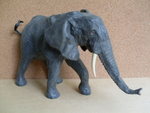
Country/State : colombia
Age : 66
Joined : 2010-11-04
Posts : 5890
 | |
  | |
bmathison1972
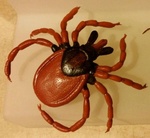
Country/State : Salt Lake City, UT
Age : 52
Joined : 2010-04-13
Posts : 6710
 |  Subject: Re: Mathison Museum of Natural History Subject: Re: Mathison Museum of Natural History  Thu Apr 06, 2023 12:47 pm Thu Apr 06, 2023 12:47 pm | |
| Species: † Cryolophosaurus ellioti Hammer & Hickerson, 1994 About the Figure: Manufacturer: Safari Ltd. Series: Wild Safari Prehistoric World Year of Production: 2022 Size/Scale: Figure length approximately 20.0 cm. Using skull as a metric (n=approx. 2.0 cm), scale comes to roughly 1:32 Frequency of species in toy/figure form (at time of posting): Uncommon Miscellaneous Notes: Cryolophosaurus has been getting some attention in recent years (whether for better or worse), with others by Papo (2017), Schleich (2020), and a 'mini' version by PNSO (2016). Today's by Safari is probably one of the best (but I am biased towards Safari's theropods); other good ones are the original by Safari in the Carnegie Collection (2010) and Battat (2014). About the Animal: Geographic distribution: Early Jurassic (Pliensbachian) of present-day Antarctica Habitat: Coniferous woodlands, river valleys and other riparian areas Diet: Predator on smaller animals; occasionally carrion IUCN Status (at time of posting): N/A [prehistoric] Miscellaneous Notes: Cryolophosaurus ellioti is probably best known for its cranial crest, which was probably used for intraspecific communication, such as announcing sexual status or for territorial display. It's been suggested Cryolophosaurus may have been social, since display features such as this are common in gregarious animals. [You must be registered and logged in to see this image.] |
|
  | |
widukind
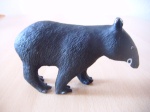
Country/State : Germany
Age : 48
Joined : 2010-12-30
Posts : 45745
 |  Subject: Re: Mathison Museum of Natural History Subject: Re: Mathison Museum of Natural History  Thu Apr 06, 2023 5:34 pm Thu Apr 06, 2023 5:34 pm | |
| |
|
  | |
bmathison1972

Country/State : Salt Lake City, UT
Age : 52
Joined : 2010-04-13
Posts : 6710
 |  Subject: Re: Mathison Museum of Natural History Subject: Re: Mathison Museum of Natural History  Fri Apr 07, 2023 1:52 pm Fri Apr 07, 2023 1:52 pm | |
| Species: Caiman crocodilus (Linnaeus, 1758) Common name(s): spectacled caiman; common caiman; brown caiman About the Figure: Manufacturer: Kaiyodo Series: Wild Rush II Year of Production: 2018 Size/Scale: Body length approximately 9.5 cm for a scale of 1:10.5-1:26.3 (see below) Frequency of species in toy/figure form (at time of posting): Very rare Miscellaneous Notes: Minimal assembly is required (tail needs to be attached). This figure is smaller than I would like, and I am likely to replace it if a 'standard-sized' version of this species get produced by a Western company. The high end of the scale above is calculated based on a maximum length of 2.5 meters About the Animal: Geographic distribution: Central and northern South America; adventive in Florida, Cuba, Puerto Rico Habitat: Slow-moving rivers, flooded savanna and grasslands, marshes Diet: Mammals, fish, crustaceans, snails IUCN Status (at time of posting): Least Concern Miscellaneous Notes: Caiman crocodilus lives in loose-knit groups, but individuals are generally solitary except during mating season. They stay in the same territory and remain immobile for most of the day. Caiman crocodilus uses nine different vocalizations and 13 visual displays to communicate with individuals of the same species. [You must be registered and logged in to see this image.] |
|
  | |
rogerpgvg
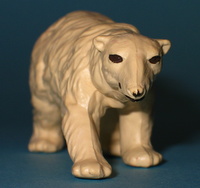
Country/State : UK
Age : 54
Joined : 2016-04-29
Posts : 3894
 |  Subject: Re: Mathison Museum of Natural History Subject: Re: Mathison Museum of Natural History  Fri Apr 07, 2023 4:27 pm Fri Apr 07, 2023 4:27 pm | |
| |
|
  | |
Kikimalou
Admin
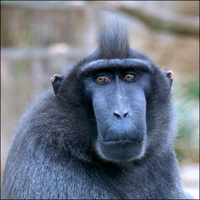
Country/State : Lille, FRANCE
Age : 60
Joined : 2010-04-01
Posts : 21169
 |  Subject: Re: Mathison Museum of Natural History Subject: Re: Mathison Museum of Natural History  Fri Apr 07, 2023 8:47 pm Fri Apr 07, 2023 8:47 pm | |
| |
|
  | |
widukind

Country/State : Germany
Age : 48
Joined : 2010-12-30
Posts : 45745
 |  Subject: Re: Mathison Museum of Natural History Subject: Re: Mathison Museum of Natural History  Fri Apr 07, 2023 9:53 pm Fri Apr 07, 2023 9:53 pm | |
| |
|
  | |
bmathison1972

Country/State : Salt Lake City, UT
Age : 52
Joined : 2010-04-13
Posts : 6710
 |  Subject: Re: Mathison Museum of Natural History Subject: Re: Mathison Museum of Natural History  Sat Apr 08, 2023 3:53 am Sat Apr 08, 2023 3:53 am | |
| - rogerpgvg wrote:
- Small but beautiful!
Not quite for you, but a good size for the 1:17-1:20 and 1:24 collectors |
|
  | |
bmathison1972

Country/State : Salt Lake City, UT
Age : 52
Joined : 2010-04-13
Posts : 6710
 |  Subject: Re: Mathison Museum of Natural History Subject: Re: Mathison Museum of Natural History  Sat Apr 08, 2023 2:16 pm Sat Apr 08, 2023 2:16 pm | |
| Species: Noctiluca scintillans (Macartney) Kofold & Swezy, 1921 Common name(s): sea tinkle; sea sparkle About the Figure: Manufacturer: Epoch Series: Ecology of Plankton Year of Production: 2004 Size/Scale: Body approximately 2.0 cm in diameter for a scale of 100:1-10:1 Frequency of species in toy/figure form (at time of posting): Very rare Miscellaneous Notes: The figures in the Ecology of Plankton collection come in little jars suspended in a goo (see inset, minus the goo), as if to simulate biological specimens in a lab. I bought my set from forum member sbell, who had already removed the goo (which I probably would have done as well). The jars measure 3.7 cm tall and are 3.0 cm in diameter. About the Animal: Geographic distribution: Worldwide in tropical, subtropical, and temperate oceans Habitat: Neritic; usually near the surface of the water along coasts and the mouths of rivers Diet: The 'green form' is autotropic with the aid of the symbiotic eukaryote Pedinomonas noctiluca when present in its vacuole; the 'red form' is heterotrophic on other planktonic organisms, such as diatoms, copepod eggs, fish eggs, and larval crustaceans IUCN Status (at time of posting): Not Evaluated Miscellaneous Notes: Noctiluca scintillans is bioluminescent; the light is produced by mechanical stimulation due to shear stress. Deformation of the cell membrane causes an action potential across the vacuole membrane caused by positively-charged calcium ions released from intracellular stores. This action potential releases an influx of protons from the vacuole to the scintilla, lowering the pH from 8 to 6. This changes the conformation of luciferase making it active. Luciferin contains a binding protein that prevents it from auto-oxidizing in an alkaline pH. It releases it by a conformational change in acidic pH, activating luciferin. [You must be registered and logged in to see this image.] |
|
  | |
Caracal
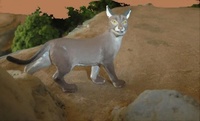
Country/State : France
Age : 65
Joined : 2018-10-24
Posts : 7252
 | |
  | |
rogerpgvg

Country/State : UK
Age : 54
Joined : 2016-04-29
Posts : 3894
 |  Subject: Re: Mathison Museum of Natural History Subject: Re: Mathison Museum of Natural History  Sat Apr 08, 2023 10:27 pm Sat Apr 08, 2023 10:27 pm | |
| Interesting to sell it in goo. It appears to be doing well in its new environment. |
|
  | |
bmathison1972

Country/State : Salt Lake City, UT
Age : 52
Joined : 2010-04-13
Posts : 6710
 |  Subject: Re: Mathison Museum of Natural History Subject: Re: Mathison Museum of Natural History  Sun Apr 09, 2023 1:14 pm Sun Apr 09, 2023 1:14 pm | |
| Species: Centrochelys sulcata (Miller, 1779) Common name(s): African spurred tortoise; Sahel tortoise About the Figure: Manufacturer: Yell Series: Channel Crocodile Gacha Gacha Year of Production: 2022 Size/Scale: Carapace length approximately 4.0 cm for a scale of 1:21.5 for a male or 1:14.5 for a female (see below) Frequency of species in toy/figure form (at time of posting): Very rare (unique? see below) Miscellaneous Notes: Hard to say for sure, but it looks like this figure may have been sculpted and painted as a juvenile, although the scales above are calculated based on adults. Based on the shape of the plastron, it's hard to tell if the figure represents a male or female (the inner margins of the scutes are straight like a male, but narrowly separated like a female). The only other figure of this species I am aware of is by Wing Mau, but I am not sure if that is what it was marketed as or if it's a community-based ID. About the Animal: Geographic distribution: Northern Africa; along the southern edge of the Sahara Desert and the Sahel Habitat: Semiarid grassland, savanna, thorn scrub Diet: Succulent plants, grasses IUCN Status (at time of posting): Endangered Miscellaneous Notes: Like other turtles and tortoises, C. sulcata has a long lifespan. In captivity, they have been documented to live up to 54 years old. Their lifespan in the wild is unknown, but speculated to exceed 75 years. [You must be registered and logged in to see this image.] |
|
  | |
widukind

Country/State : Germany
Age : 48
Joined : 2010-12-30
Posts : 45745
 |  Subject: Re: Mathison Museum of Natural History Subject: Re: Mathison Museum of Natural History  Mon Apr 10, 2023 10:11 am Mon Apr 10, 2023 10:11 am | |
| |
|
  | |
bmathison1972

Country/State : Salt Lake City, UT
Age : 52
Joined : 2010-04-13
Posts : 6710
 |  Subject: Re: Mathison Museum of Natural History Subject: Re: Mathison Museum of Natural History  Mon Apr 10, 2023 3:05 pm Mon Apr 10, 2023 3:05 pm | |
| Species: † Funisia dorothea Droser & Gehling, 2008 About the Figure: Manufacturer: Paleozoo Series: Ediacaran Biota Year of Production: 2017 Size/Scale: Individual animals on average 5.5-6.5 cm tall, for a scale of approximately 1:5 Frequency of species in toy/figure form (at time of posting): Unique Miscellaneous Notes: Paleozoo models are 3D-printed. They can be fragile and I've had breakage of more than one of their models in the past during shipping (including todays; but it was easily rectified with glue). About the Animal: Geographic distribution: Ediacaran of present-day Australia Habitat: Marine; benthic in sandy areas Diet: Unknown; possibly filter-feeding of drifting plankton or nutrients derived from symbiotic microorganisms IUCN Status (at time of posting): N/A [prehistoric] Miscellaneous Notes: Funisia dorothea is believed to be one of the oldest known animals that engaged in sexual reproduction. [You must be registered and logged in to see this image.] |
|
  | |
Saarlooswolfhound
Moderator

Country/State : USA
Age : 28
Joined : 2012-06-16
Posts : 12056
 |  Subject: Re: Mathison Museum of Natural History Subject: Re: Mathison Museum of Natural History  Mon Apr 10, 2023 5:37 pm Mon Apr 10, 2023 5:37 pm | |
| What a fantastically weird creature. :) _________________ -"I loathe people who keep dogs. They are cowards who haven’t got the guts to bite people themselves."-August Strindberg (However, anyone who knows me knows I love dogs [You must be registered and logged in to see this image.] ) -“We can try to kill all that is native, string it up by its hind legs for all to see, but spirit howls and wildness endures.”-Anonymous |
|
  | |
widukind

Country/State : Germany
Age : 48
Joined : 2010-12-30
Posts : 45745
 |  Subject: Re: Mathison Museum of Natural History Subject: Re: Mathison Museum of Natural History  Tue Apr 11, 2023 9:53 am Tue Apr 11, 2023 9:53 am | |
| |
|
  | |
bmathison1972

Country/State : Salt Lake City, UT
Age : 52
Joined : 2010-04-13
Posts : 6710
 |  Subject: Re: Mathison Museum of Natural History Subject: Re: Mathison Museum of Natural History  Tue Apr 11, 2023 12:35 pm Tue Apr 11, 2023 12:35 pm | |
| Species: Aratinga solstitialis (Linnaeus, 1758) Common name(s): sun parakeet; sun conure About the Figure: Manufacturer: Play Visions Series: Parrots & Cockatoos Year of Production: 1996 Size/Scale: Body length approximately 5.0 cm for a scale of 1:5 Frequency of species in toy/figure form (at time of posting): Rare Miscellaneous Notes: This figure was somewhat challenging to photograph because of its posture, and that PV parrots don't stand up well on their own over time! Additional figures of this species were made by Nayab and Shine-G. About the Animal: Geographic distribution: Guiana Shield of northeastern South America, mostly north of the Amazon River in northern Brazil, southern Guyana, southern Suriname, and southern French Guiana. Habitat: Dry savanna woodlands, open savanna, coastal woodlands, scrubland, forested valleys Diet: Fruits, seeds, nuts, flowers and flower buds, and occasionally insects IUCN Status (at time of posting): Endangered Miscellaneous Notes: Aratinga solstitialis is very social and can live in groups upwards of 15-30 individuals (although smaller groups of 3-5 are not uncommon). Pairs are monogamous and after breeding, pairs become increasingly affectionate to one another, but more aggressive to other birds (and people who keep these birds as pets). [You must be registered and logged in to see this image.] |
|
  | |
widukind

Country/State : Germany
Age : 48
Joined : 2010-12-30
Posts : 45745
 |  Subject: Re: Mathison Museum of Natural History Subject: Re: Mathison Museum of Natural History  Tue Apr 11, 2023 12:47 pm Tue Apr 11, 2023 12:47 pm | |
| A specie not known by Major brands but a few different figures exist. |
|
  | |
bmathison1972

Country/State : Salt Lake City, UT
Age : 52
Joined : 2010-04-13
Posts : 6710
 |  Subject: Re: Mathison Museum of Natural History Subject: Re: Mathison Museum of Natural History  Wed Apr 12, 2023 1:47 pm Wed Apr 12, 2023 1:47 pm | |
| Species: Physignathus cocincinus Cuvier, 1829 Common name(s): Chinese water dragon; green water dragon About the Figure: Manufacturer: Yujin Series: Primary Colour Lizards Book Year of Production: 2002 Size/Scale: Snout-to-vent length approximately 5.5 cm for a scale of 1:4.5 Frequency of species in toy/figure form (at time of posting): Very rare Miscellaneous Notes: This figure has an interesting pedigree. Many of the figures in Yujin's 2002 lizard collection are reuses of figures produced by Wing Mau for Club Earth and Play Visions, sometimes using the sculpt for a different species than the original. Such was the case for today's Chinese water dragon. Wing Mau originally produced this sculpt for Club Earth as a green iguana (presumably a juvenile specimen). Figures produced by both Wing Mau and Yujin have the animal's common English name printed on the underside, so there is no doubt to the species' intended identity. Interestingly, this is not the only iguana-water dragon switcheroo. AAA produced two Chinese water dragons that were cast from actual specimens, and yet interestingly were sold mislabeled as iguanas! About the Animal: Geographic distribution: Southeast Asia (southern China, Thailand, Vietnam, Cambodia, Myanmar); introduced to Taiwan Habitat: Lowland rainforest, usually along rocky streams and lakes; occasionally around vegetated streams near villages and agricultural fields Diet: Primarily insects; occasionally mollusks, crustaceans, small vertebrates (fish, reptiles, birds, mammals), eggs, and vegetation IUCN Status (at time of posting): Vulnerable Miscellaneous Notes: Physignathus cocincinus is diurnal, and spends much of its time on the branches of trees or on other plants overhanging water. When a would-be predator or other threat approaches, the lizard dives into the water where it can either safely swim away or stay submerged for upwards of 90 minutes. [You must be registered and logged in to see this image.] |
|
  | |
widukind

Country/State : Germany
Age : 48
Joined : 2010-12-30
Posts : 45745
 |  Subject: Re: Mathison Museum of Natural History Subject: Re: Mathison Museum of Natural History  Wed Apr 12, 2023 5:18 pm Wed Apr 12, 2023 5:18 pm | |
| |
|
  | |
Caracal

Country/State : France
Age : 65
Joined : 2018-10-24
Posts : 7252
 | |
  | |
bmathison1972

Country/State : Salt Lake City, UT
Age : 52
Joined : 2010-04-13
Posts : 6710
 |  Subject: Re: Mathison Museum of Natural History Subject: Re: Mathison Museum of Natural History  Thu Apr 13, 2023 12:37 pm Thu Apr 13, 2023 12:37 pm | |
| Species: † Gastornis gigantea (Cope, 1876) Common name(s): terror bird About the Figure: Manufacturer: Safari Ltd. Series: Wild Safari Prehistoric World Year of Production: 2013 Size/Scale: Figure height approximately 7.0 cm. Scale difficult to calculate based on posture, but using skull as a metric (n=3.0 cm), scale comes to approximately 1:17 Frequency of species in toy/figure form (at time of posting): Uncommon Miscellaneous Notes: Earlier figures of this genus are usually sold under the name Diatryma, which is now considered a synonym of Gastornis. The 1998 model by Bullyland was sold as a 'Predatory Ratite' even though we now know these birds were not closely related to modern ratites. Decent smaller versions of this genus were made by Kaiyodo (2001) and Colorata (2019). About the Animal: Geographic distribution: Lower to Middle Eocene of present day western North America Habitat: Riparian woodlands, coastal marshes, forested lake margins, savanna Diet: Plant material IUCN Status (at time of posting): N/A [prehistoric] Miscellaneous Notes: Gastornis gigantea has historically been depicted as a predator, usually hunting small horses. Recent studies suggest it was an obligate herbivore. The bird lacked a prominently hooked beak and hooked talons on the hing legs, which are common features of extant predatory birds. The large beak of Gastornis may have been used for cracking nuts and seeds or shearing grasses. Studies of calcium isotopes in bones of Gastornis showed no evidence of meat in its diet. [You must be registered and logged in to see this image.]
Last edited by bmathison1972 on Thu Apr 13, 2023 4:35 pm; edited 1 time in total |
|
  | |
widukind

Country/State : Germany
Age : 48
Joined : 2010-12-30
Posts : 45745
 |  Subject: Re: Mathison Museum of Natural History Subject: Re: Mathison Museum of Natural History  Thu Apr 13, 2023 3:38 pm Thu Apr 13, 2023 3:38 pm | |
| |
|
  | |
Caracal

Country/State : France
Age : 65
Joined : 2018-10-24
Posts : 7252
 | |
  | |
pipsxlch

Country/State : US/Florida
Age : 56
Joined : 2015-03-13
Posts : 2849
 |  Subject: Re: Mathison Museum of Natural History Subject: Re: Mathison Museum of Natural History  Fri Apr 14, 2023 3:09 am Fri Apr 14, 2023 3:09 am | |
| That is very interesting to know. Not such a terrible bird then. |
|
  | |
Sponsored content
 |  Subject: Re: Mathison Museum of Natural History Subject: Re: Mathison Museum of Natural History  | |
| |
|
  | |
| | Mathison Museum of Natural History |  |
|
